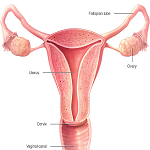Written by Dr.M.D.Mazumdar, MD
Dental Care in pregnancy is very important. The high levels of
progesterone and estrogen in the body at this time increases the blood flow throughout the body, including the gums. This can lead to softening of the gums increasing the susceptibility to tooth and gum infection.
Dental Problems during Pregnancy
Bleeding and swollen gums: Bleeding and sensitive gums occurring during pregnancy is called 'pregnancy gingivitis'. It occurs in 50% of all pregnant women. Bleeding usually occurs when brushing or flossing the teeth. It can cause such discomfort that even eating can be difficult.
The increased blood supply to the gums can cause them to swell up and bleed. It also makes the gums more vulnerable to bacteria in the mouth leading to infections.
Periodontitis: In this condition the infection goes beyond the gums into the underlying bone. There can be severe pain and even loss of teeth.
Pregnancy Tumour : Occasionally a small nodule may develop inside the mouth, usually on the gums. This nodule is painless and harmless but can bleed on touch. This condition is very uncommon.
Risks of Dental Infections
Miscarriage/Abortion: Miscarriage in very early pregnancy in some women is believed to be due to infections reaching the uterus from the gums.
Premature Delivery: Studies have shown that pregnant women with gum disease are more likely to have a premature delivery.
Pre-eclamptic Toxaemia: Research has shown a relation between gum disease and a condition called pre-clampsia (PET) where the blood pressure can go very high. There can be associated problems like excretion of protein in the urine and swelling of the feet and ankles. PET can be risky to both the mother and the baby.
Tooth Myths During Pregnancy
Drinking milk during pregnancy will ensure good teeth in the baby - This is not true. While drinking milk provides calcium to the mother, there is no evidence that it will help the baby to get healthy teeth as well.
Dental treatments affect the taste of breast milk - Not true. The taste and quality of the breast milk is not affected in any way by any dental treatments, including metal fillings.
Fluoride in toothpastes or as supplements can hurt the baby - False. Taking fluoride supplements during pregnancy or fluoride present in toothpastes do not cross the placenta and will not affect the baby.
Mercury Fillings can affect the baby - There is no evidence that supports this claim. In a review conducted by the U.S. Department of Health and Human Services (HHS), it was concluded that dental fillings containing mercury pose no health risk in the fetus, except in the extremely rare case that a patient is allergic to them.
But if you are still fearful about the effects of mercury in the fillings, you can ask your dentist for composite fillings. If you already have mercury fillings, it is not necessary to take them out.
Tooth Care in Pregnancy
It is ideal to visit the dentist as soon as pregnancy occurs. If this is not possible, pay a visit at least once during your pregnancy for a proper dental checkup. It is best done during the second trimester.
Brush and floss your teeth at least twice daily, especially after eating sugary snacks and juices. Brush thoroughly and try to endure that you brush the backs of teeth which are difficult to reach.
Use a good quality toothbrush with soft bristles and a toothpaste containing fluoride. Electric toothbrushes are better than the manual ones.
Brush your teeth with your fingers after every meal. Rinse your mouth vigorously to flush out all food particles.
If you have nausea and vomiting , do not brush immediately after being sick. The acid in the vomitus can erode the teeth. Rinse your mouth thoroughly with warm water instead.
Limit the sweets and snacks you eat during the day, or at least try to switch to hard fruits like apples that have a rubbing action on your teeth.
Increase your intake of milk and other dairy products to get more calcium in your diet.
Have a thorough dental checkup. Contact your dentist immediately if you have toothache, loose teeth, bleeding gums or persistent bad breath. Recent advances in local anesthesia and antibiotics have made it possible to undergo any dental procedures you may need during your pregnancy.
Inform your doctor about your pregnancy so that he can avoid X-rays and certain medicines that can harm your baby.
Read More:
Also Read-
Do you have a gynecological or obstetrical problem? Would you like to discuss it in private? Consult our online gynecologist Dr.M.D.Mazumdar, MD (O&G), at any time you want and get your reply within 24 hours.We charge a nominal fee of USD 20 ($20) per question through Paypal.com.
The procedure of asking a question is quite simple. Clicking on the link below takes you to the Paypal website where the payment is made. After the payment goes through, you will be directed back to this website where you can ask your question. And rest assured, you will get your answer within 24 hours. And usually, even sooner.


